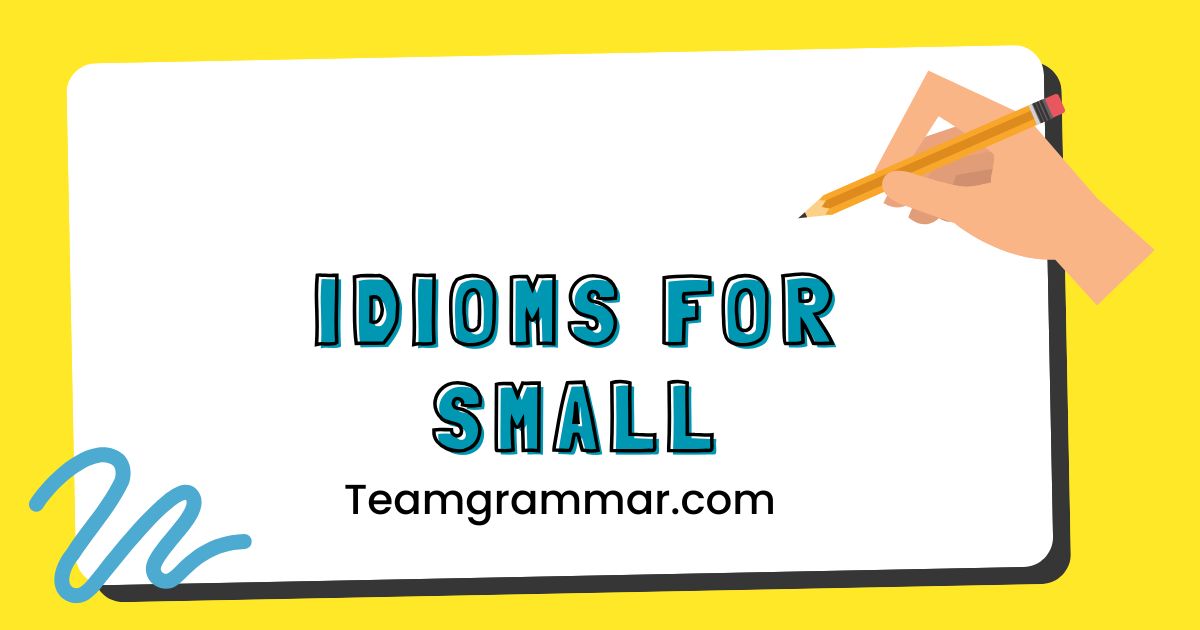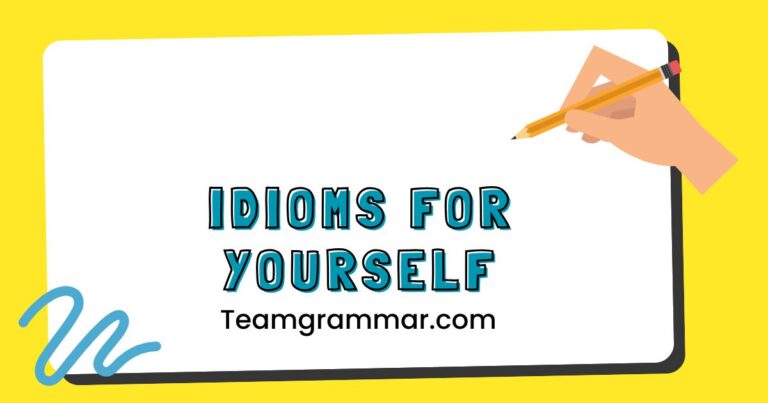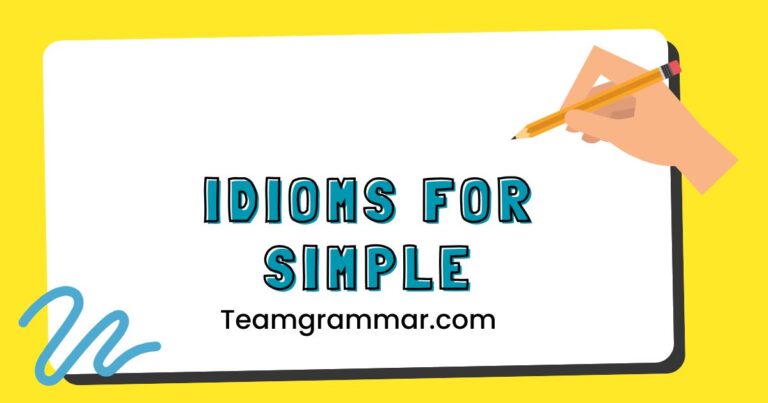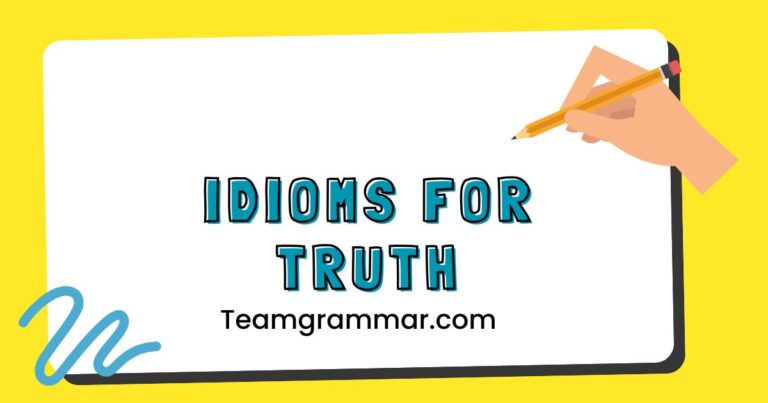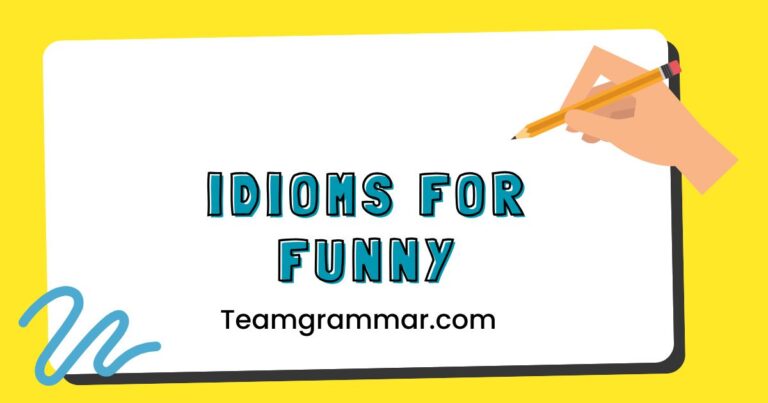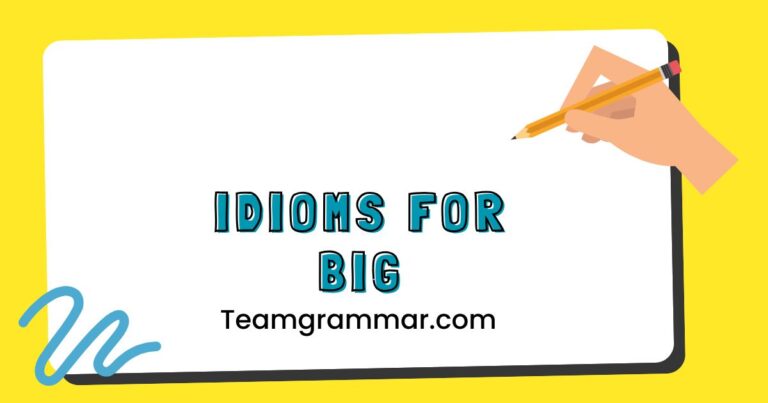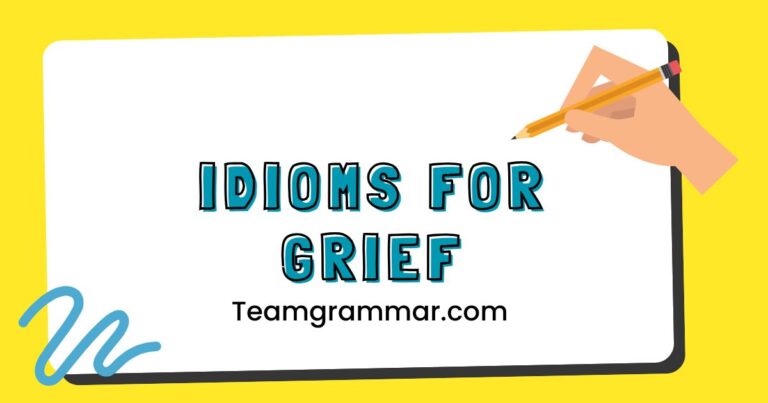33 Idioms for Small: Mastering English Expressions
Understanding idioms is crucial for mastering English, allowing for richer comprehension and more natural communication. Idioms add color and nuance to language, conveying meanings that go beyond the literal interpretations of individual words.
This article focuses on idioms related to the concept of “small,” exploring their diverse meanings, structural elements, and usage. Whether you’re an ESL student, a language enthusiast, or simply looking to enhance your vocabulary, this guide will provide you with the knowledge and practice needed to confidently use idioms for small in your everyday conversations and writing.
Table of Contents
- Introduction
- Definition of Idioms for Small
- Structural Breakdown
- Types and Categories of Idioms for Small
- Examples of Idioms for Small
- Usage Rules
- Common Mistakes
- Practice Exercises
- Advanced Topics
- FAQ
- Conclusion
Introduction
Idioms are phrases or expressions whose meanings cannot be understood from the literal definitions of the individual words. They add color, depth, and cultural context to language.
Mastering idioms is vital for anyone seeking fluency in English. This article focuses on idioms that relate to the concept of “small,” covering a range of meanings from physical size to importance and duration.
By understanding these idioms, learners can significantly improve their comprehension and ability to express themselves more naturally and effectively.
Definition of Idioms for Small
Idioms for “small” are expressions that use the concept of smallness to convey meanings that are not literally related to size. These idioms can refer to physical dimensions, quantity, importance, duration, or cost.
The key characteristic of an idiom is that its meaning is figurative and cannot be deduced from the individual words it contains. Understanding these idioms requires familiarity with their specific cultural and linguistic contexts.
Idioms related to “small” often fall into several categories. For instance, some idioms describe physical smallness directly, while others use the concept of smallness metaphorically to represent insignificance or brevity.
The function of these idioms is to add nuance and color to communication, allowing speakers and writers to express complex ideas in a concise and engaging manner. The context in which an idiom is used is crucial for understanding its intended meaning.
Classification of Idioms for Small
Idioms for “small” can be classified based on the aspect of smallness they emphasize:
- Size: These idioms refer to physical dimensions.
- Quantity: These idioms indicate a small amount.
- Importance: These idioms suggest a lack of significance.
- Duration: These idioms denote a short period.
- Cost: These idioms imply a low price.
Function of Idioms for Small
The primary function of idioms for “small” is to express ideas more vividly and concisely than literal language. They can add emphasis, humor, or emotional impact to communication.
Idioms also serve as cultural markers, reflecting the shared experiences and values of a language community. By using idioms effectively, speakers and writers can establish rapport with their audience and create a sense of familiarity.
Contexts for Idioms for Small
Idioms for “small” can be used in a wide range of contexts, from informal conversations to formal writing. However, it is important to consider the audience and purpose when choosing an idiom.
Some idioms may be more appropriate for casual settings, while others may be suitable for professional or academic contexts. Understanding the connotations and cultural associations of an idiom is essential for using it effectively and avoiding miscommunication.
Structural Breakdown
Idioms, unlike regular phrases, have a fixed structure. You can’t usually change the words or the order without altering or losing the meaning.
Understanding the structural elements of idioms helps in recognizing and using them correctly. The structures can vary but generally include a combination of nouns, verbs, adjectives, and prepositions.
The structural patterns in idioms related to “small” are often metaphorical, drawing a comparison between the literal meaning of “small” and the intended figurative meaning. For example, the idiom “a drop in the bucket” uses the image of a small drop to represent something insignificant compared to a larger whole.
Similarly, “small potatoes” uses the idea of small potatoes to mean something unimportant or trivial.
Structural Elements
Common structural elements found in idioms for “small” include:
- Nouns: Small potatoes, a small fortune
- Verbs: Think small, start small
- Adjectives: A small price to pay
- Prepositions: In a small way
Patterns in Idioms for Small
Several patterns can be observed:
- Comparisons: Using “small” to compare something’s insignificance. (e.g., “a drop in the bucket”).
- Metaphors: Using “small” to represent something else entirely. (e.g., “small potatoes”).
Rules and Flexibility
While idioms are generally fixed, some idioms allow for slight variations depending on context. However, changing the key words can often destroy the idiomatic meaning.
It’s crucial to understand the core structure of an idiom before attempting to modify it.
Types and Categories of Idioms for Small
Idioms relating to “small” can be categorized based on what aspect of “smallness” they emphasize. These categories help to understand the nuance and context in which each idiom should be used.
The main categories include idioms related to size, quantity, importance, duration, and cost.
Size-Related Idioms
These idioms directly or indirectly refer to physical dimensions. They might describe something that is literally small or use the concept of smallness to illustrate other qualities.
Quantity-Related Idioms
These idioms describe a small amount or quantity of something. They often emphasize the scarcity or limited nature of what is being discussed.
Importance-Related Idioms
These idioms convey a lack of significance or importance. They often use the concept of smallness to diminish the value or impact of something.
Duration-Related Idioms
These idioms refer to a short period of time or duration. They often emphasize the brevity or fleeting nature of an event or experience.
Cost-Related Idioms
These idioms describe a low price or cost. They often highlight the affordability or value of something.
Examples of Idioms for Small
Understanding idioms requires seeing them in context. The following tables provide examples of idioms for “small,” categorized by their primary meaning.
Each example is accompanied by a definition and a sentence illustrating its use.
Idioms Related to Actual Size
These idioms directly or indirectly refer to physical dimensions.
The following table contains idioms that relate to the size of something. Each idiom includes a definition and an example sentence to illustrate its use.
| Idiom | Definition | Example Sentence |
|---|---|---|
| Bite-sized | Small and easy to consume or understand. | The teacher broke the complex topic into bite-sized pieces for the students. |
| Pocket-sized | Small enough to fit in a pocket. | He carried a pocket-sized notebook everywhere he went. |
| In a nutshell | Briefly, in a few words. | In a nutshell, the project was a success. |
| Think small | To consider modest goals or plans. | When starting a business, it’s often wise to think small at first. |
| Small world | An expression used when encountering someone unexpectedly. | “Small world! I didn’t expect to see you here.” |
| Shrinking violet | A shy person. | She’s no shrinking violet; she speaks her mind. |
| A drop in the ocean/bucket | A very small amount compared to what is needed. | Our donation was just a drop in the ocean compared to the total cost. |
| Teeny-tiny | Extremely small. | The baby had teeny-tiny fingers and toes. |
| Itsy-bitsy | Very small. | There was an itsy-bitsy spider climbing up the wall. |
| Miniature | A much smaller version of something. | He collected miniature cars. |
| Diminutive | Extremely or unusually small. | The diminutive actor was surprisingly powerful on stage. |
| Microscopic | So small as to be visible only with a microscope. | The bacteria were microscopic. |
| Peewee | Very small, especially a young child. | The peewee football team was adorable. |
| In a confined space | In a small, enclosed area. | Working in a confined space can be challenging. |
| Under a microscope | Being scrutinized or examined closely. | His actions were under a microscope after the scandal. |
| Little by little | Gradually, in small increments. | Little by little, she improved her skills. |
| Button-sized | Very small, like the size of a button. | The camera on the drone was button-sized. |
| Thimble-sized | Extremely small, like the size of a thimble. | She poured a thimble-sized amount of cream into her coffee. |
| Grain of sand | An extremely small amount. | His contribution was like a grain of sand on a beach. |
| A speck of dust | A tiny particle of something. | There was a speck of dust on the lens. |
| A sliver of | A small, thin piece of something. | He ate a sliver of cake. |
| Pint-sized | Small in stature. | The pint-sized athlete was surprisingly strong. |
| Inch by inch | Slowly and gradually. | Inch by inch, they moved the heavy furniture. |
Idioms Related to Small Quantity
These idioms describe a small amount or quantity of something.
The following table showcases idioms that emphasize a small quantity or amount. Understanding these idioms can help you express scarcity or limitation more effectively.
| Idiom | Definition | Example Sentence |
|---|---|---|
| A handful of | A small number or amount. | Only a handful of people attended the meeting. |
| A smattering of | A small amount, often scattered. | She had a smattering of knowledge about art history. |
| Few and far between | Not frequent, rare. | Sunny days are few and far between in this region. |
| A trickle | A small, slow flow. | Information came in a trickle. |
| A modicum of | A small quantity of something desirable or valuable. | He showed a modicum of respect. |
| A pinch of | A very small amount, especially of an ingredient. | Add just a pinch of salt. |
| Dribs and drabs | Small amounts at irregular intervals. | The money came in dribs and drabs. |
| A soupçon of | A very small amount of something, especially a flavor. | The sauce had a soupçon of garlic. |
| A touch of | A small amount. | The room needed a touch of color. |
| A jot | A tiny amount. | He doesn’t care a jot about what people think. |
| Scant | Barely sufficient or adequate. | The evidence was scant. |
| Meager | Lacking in quantity or quality. | They survived on a meager income. |
| Sparse | Thinly dispersed or scattered. | The population was sparse in the rural areas. |
| A fragment of | A small piece or part of something. | She remembered only a fragment of the dream. |
| A shred of | A very small amount. | There wasn’t a shred of evidence. |
| A whisper of | A trace amount. | There was a whisper of doubt in her mind. |
| A scintilla of | A tiny spark or trace. | There wasn’t a scintilla of remorse in his eyes. |
| A shadow of | A faint trace. | There’s only a shadow of hope left. |
| A fleck of | A small spot or mark. | There was a fleck of paint on his shirt. |
| A hair’s breadth | A very small distance or margin. | They missed the deadline by a hair’s breadth. |
| A drop in the ocean | A very small amount compared to what is needed. | Our donation was just a drop in the ocean compared to the total cost. |
| A mere pittance | A very small or inadequate amount of money. | They were paid a mere pittance for their hard work. |
Idioms Related to Lack of Importance
These idioms convey a lack of significance or importance.
The following table provides idioms that highlight the lack of importance or significance of something. Learning these idioms can help you express triviality and unimportance with greater impact.
| Idiom | Definition | Example Sentence |
|---|---|---|
| Small potatoes | Unimportant, trivial. | The issue is small potatoes compared to the real problems. |
| Not a big deal | Not important. | It’s not a big deal if we’re a few minutes late. |
| Of little consequence | Not important or significant. | His opinion is of little consequence in this matter. |
| Not worth a dime | Worthless. | His promises are not worth a dime. |
| A flash in the pan | Something that shows initial promise but fails to deliver. | The band’s success was just a flash in the pan. |
| Water off a duck’s back | Having no effect. | Criticism is like water off a duck’s back to him. |
| Much ado about nothing | A lot of fuss about something unimportant. | The argument turned out to be much ado about nothing. |
| A tempest in a teapot | A big fuss about a trivial matter. | The disagreement was just a tempest in a teapot. |
| Neither here nor there | Irrelevant, not important. | Whether he agrees or not is neither here nor there. |
| Not worth the paper it’s written on | Worthless, unreliable. | The contract wasn’t worth the paper it was written on. |
| A moot point | A point that is not worth discussing because it is irrelevant. | Whether we should have gone is a moot point now. |
| A trivial matter | Something of little importance. | The details are just a trivial matter. |
| Insignificant | Not important; of no consequence. | The error was insignificant. |
| Of no account | Of no importance or value. | His opinion is of no account to me. |
| A bagatelle | A thing of little importance; a trifle. | The cost was a mere bagatelle. |
| A trifle | A thing of little value or importance. | The mistake was a trifle. |
| A lightweight | A person with little influence or importance. | He’s a political lightweight. |
| A nothingburger | Something inconsequential or lacking substance. | The scandal turned out to be a nothingburger. |
| Not worth a bean | Worthless or of little value. | His advice wasn’t worth a bean. |
| Not worth two cents | Of very little value or importance. | His opinion isn’t worth two cents. |
Idioms Related to Short Duration
These idioms refer to a short period of time or duration.
The following table includes idioms that describe a brief duration or short period of time. Understanding these idioms can help you express the concept of brevity more effectively.
| Idiom | Definition | Example Sentence |
|---|---|---|
| In a flash | Very quickly. | The storm passed in a flash. |
| In a jiffy | Very quickly, in a short time. | I’ll be back in a jiffy. |
| In the blink of an eye | Very quickly. | The children grew up in the blink of an eye. |
| A short while | A brief period. | I’ll be there in a short while. |
| A fleeting moment | A brief, passing moment. | It was just a fleeting moment of happiness. |
| Here today, gone tomorrow | Temporary, not lasting. | Fashions are here today, gone tomorrow. |
| A quickie | Something done quickly and briefly. | Let’s have a quickie meeting before lunch. |
| In a heartbeat | Very quickly, without hesitation. | I’d help you in a heartbeat. |
| As quick as a bunny | Very fast. | She finished the race as quick as a bunny. |
| A New York minute | A very short time, perceived as even shorter due to the fast pace of life in New York. | He expected the project to be completed in a New York minute. |
| In passing | Briefly or casually. | I mentioned it in passing. |
| A mere instant | A very short moment. | It happened in a mere instant. |
| A short span | A brief period of time. | He lived a short span of years. |
| In no time | Very quickly or soon. | We’ll be there in no time. |
| A moment’s notice | With very little warning or preparation. | He had to leave at a moment’s notice. |
| A split second | An extremely short period of time. | The decision had to be made in a split second. |
| In short order | Quickly and efficiently. | The problem was resolved in short order. |
| A trice | A very short time; an instant. | I’ll be there in a trice. |
| A wink of an eye | A very short time. | It all happened in the wink of an eye. |
| A flash flood | Something that occurs suddenly and briefly. | The news spread like a flash flood. |
Idioms Related to Low Cost
These idioms describe a low price or cost.
The following table presents idioms that convey the idea of low cost or affordability. Learning these idioms can help you express the value or cheapness of something more vividly.
| Idiom | Definition | Example Sentence |
|---|---|---|
| Dirt cheap | Very inexpensive. | The clothes were dirt cheap at the sale. |
| A steal | A bargain, something bought at a very low price. | The car was a steal at that price. |
| A song | Something sold at a very low price. | They practically gave it away for a song. |
| For peanuts | For very little money. | He worked for peanuts. |
| On the cheap | Inexpensively, cheaply. | We traveled on the cheap. |
| A small price to pay | Worth the cost, even if it’s inconvenient. | It was a small price to pay for their safety. |
| Bargain basement | Very low-priced. | The store had bargain basement prices. |
| At a discount | At a reduced price. | We bought the tickets at a discount. |
| Reduced to clear | Sold at a lower price to get rid of stock. | The items were reduced to clear. |
| On sale | Available at a lower price than usual. | The shoes were on sale. |
| Affordable | Not too expensive. | The housing was surprisingly affordable. |
| Budget-friendly | Inexpensive and suitable for those on a budget. | The hotel was budget-friendly. |
| Economical | Providing good value or service in relation to the money spent. | The car was very economical to run. |
| Reasonably priced | Fairly priced; not too expensive. | The restaurant was reasonably priced. |
| Cost-effective | Producing good results for the amount of money spent. | The new system was cost-effective. |
| Thrifty | Using money and resources carefully and not wastefully. | She was a thrifty shopper. |
| Easy on the wallet | Inexpensive; not costing much money. | The vacation package was easy on the wallet. |
| A good buy | Something that is worth the money spent on it. | The car was a good buy. |
| A smart buy | A purchase that is sensible and economical. | The energy-efficient appliance was a smart buy. |
Usage Rules
Using idioms correctly requires understanding their specific contexts and connotations. While idioms add color to language, using them inappropriately can lead to confusion or miscommunication.
It’s essential to consider the audience, purpose, and setting when choosing an idiom.
When using idioms for “small,” ensure that the intended meaning aligns with the context. For example, using “small potatoes” in a formal business presentation might be inappropriate, while it could be perfectly acceptable in a casual conversation with colleagues.
Similarly, idioms related to duration, such as “in a flash,” should be used when emphasizing the brevity of an event or experience.
Formal vs. Informal Usage
Some idioms are more appropriate for informal settings, while others can be used in formal contexts. For instance, “dirt cheap” is suitable for casual conversations but not for formal business reports.
“Economical” and “cost-effective” are better choices for formal settings when discussing low prices.
Cultural Considerations
Idioms are often culturally specific, and their meanings may not translate directly across different languages or cultures. Be mindful of your audience’s cultural background when using idioms.
Some idioms may be offensive or confusing to people from different cultures.
Avoiding Clichés
While idioms can add flavor to language, overuse can make your writing or speech sound clichéd. Use idioms sparingly and choose them carefully to ensure they have the desired impact.
Strive for originality and avoid relying on overused expressions.
Common Mistakes
Learners often make mistakes when using idioms, particularly when they try to interpret them literally or when they are unfamiliar with the specific context in which an idiom is used. Common mistakes include misinterpreting the meaning, using the wrong idiom, or altering the structure of the idiom.
One common mistake is to assume that the meaning of an idiom can be derived from the individual words it contains. For example, someone might incorrectly assume that “small potatoes” refers to actual small potatoes, rather than something unimportant.
Another mistake is to use an idiom in the wrong context, such as using a casual idiom in a formal setting.
Altering the structure of an idiom is another frequent error. Idioms have a fixed structure, and changing the words or word order can alter or destroy the meaning.
For example, saying “tiny potatoes” instead of “small potatoes” changes the meaning and makes the phrase no longer idiomatic.
The table below illustrates common mistakes and provides correct alternatives.
| Incorrect | Correct | Explanation |
|---|---|---|
| The problem is tiny potatoes. | The problem is small potatoes. | “Small potatoes” is the correct idiom. |
| It happened in a blink eye. | It happened in the blink of an eye. | The correct idiom includes “of.” |
| He worked for dirt cheap money. | He worked for dirt cheap. | “Dirt cheap” is the idiom; “money” is redundant. |
| It’s not a large deal. | It’s not a big deal. | The idiom is “big deal,” not “large deal.” |
Practice Exercises
Practice is essential for mastering idioms. The following exercises will help you test your understanding of idioms for “small.” Each exercise includes a variety of question types, such as multiple-choice, fill-in-the-blank, and sentence completion.
Exercise 1: Multiple Choice
Choose the correct idiom to complete the sentence.
| Question | Options | Answer |
|---|---|---|
| The mistake was ________ compared to the overall success. | a) small potatoes b) big potatoes c) tiny potatoes d) large potatoes | a) small potatoes |
| I’ll be there ________. | a) in a while short b) a short while c) while short a d) short a while | b) a short while |
| She bought the dress ________. | a) on the expensive b) on the cheap c) on the costly d) on the dear | b) on the cheap |
| The event happened ________. | a) in a eye of blink b) in the blink from eye c) in a blink of an eye d) in the blink of eye | c) in a blink of an eye |
| He only had ________ of knowledge about the subject. | a) a handful b) a plenty c) a lot d) a heap | a) a handful |
| The rain was ________. | a) coming in torrents b) coming in drips c) coming in dribs and drabs d) coming in buckets | c) coming in dribs and drabs |
| The car was so cheap, it was ________. | a) a bargain b) a theft c) a robbery d) a steal | d) a steal |
| They paid him ________ for his work. | a) a fortune b) a king’s ransom c) peanuts d) a large sum | c) peanuts |
| The problem was resolved ________. | a) in long order b) in short order c) in tall order d) in brief order | b) in short order |
| His contribution was just ________ in the bucket. | a) a drop b) a sea c) an ocean d) a lake | a) a drop |
Exercise 2: Fill in the Blank
Fill in the blank with the correct idiom.
| Question | Answer |
|---|---|
| The issue is ________ compared to the major concerns. | small potatoes |
| I’ll be back ________, just wait here. | in a jiffy |
| She learned the language ________, little by little. | little by little |
| The changes happened ________; it was hard to keep up. | in a flash |
| They bought the house ________; it was a great deal. | for a song |
| They missed the deadline by ________. | a hair’s breadth |
| The evidence was ________, making it hard to convict him. | scant |
| He had to leave ________ because of the emergency. | at a moment’s notice |
| Her success was just ________, disappearing quickly. | a flash in the pan |
| The argument was just ________; it didn’t matter in the end. | much ado about nothing |
Exercise 3: Sentence Completion
Complete the following sentences using an appropriate idiom for “small.”
| Question | Answer |
|---|---|
| Even though the project had some setbacks, they were just ________. | small potatoes in the grand scheme of things |
| I thought I had plenty of time, but the deadline
was ________. |
in the blink of an eye |
| Despite his initial hesitation, he agreed to help ________. | in a heartbeat |
| The amount of rain we’ve had this month is ________. | few and far between |
| They were able to buy the furniture ________, which helped them save money. | on the cheap |
Advanced Topics
For advanced learners, exploring the etymology and historical context of idioms can provide a deeper understanding of their meanings and usage. Investigating how idioms evolve over time and how they vary across different dialects can also be insightful.
Additionally, analyzing the use of idioms in literature and media can enhance comprehension and appreciation of their artistic and rhetorical effects. Advanced learners can also explore the creation of new idioms and the factors that contribute to their adoption and spread within a language community.
Etymology of Idioms
Understanding the origins of idioms can provide valuable insights into their meanings and cultural significance. Many idioms have historical roots that shed light on their figurative interpretations.
Idiomatic Variation
Idioms can vary across different dialects and regions. Exploring these variations can enhance understanding of linguistic diversity and cultural nuances.
Idioms in Literature and Media
Analyzing how idioms are used in literature and media can reveal their artistic and rhetorical effects. Authors and speakers often use idioms to add depth, humor, or emotional impact to their work.
FAQ
This section addresses frequently asked questions about idioms for “small,” providing clear and concise answers to common queries.
What is the difference between an idiom and a metaphor?
An idiom is a phrase whose meaning cannot be understood from the literal definitions of its individual words, while a metaphor is a figure of speech that directly compares two unrelated things. Idioms often rely on metaphorical language, but not all metaphors are idioms.
How can I improve my understanding of idioms?
Immerse yourself in the language by reading books, watching movies, and listening to native speakers. Pay attention to the context in which idioms are used and look up their meanings in a dictionary or online resource.
Practice using idioms in your own writing and speech.
Are idioms the same in all English-speaking countries?
No, idioms can vary across different English-speaking countries and regions. Some idioms may be unique to a particular country or dialect, while others may have different meanings or connotations in different places.
Be mindful of these variations when communicating with people from different backgrounds.
Is it okay to use idioms in formal writing?
It depends on the idiom and the context of the writing. Some idioms are appropriate for formal settings, while others are more suitable for informal communication.
Consider your audience and purpose when deciding whether to use an idiom in formal writing.
How can I avoid misusing idioms?
Pay attention to the context in which idioms are used and look up their meanings in a dictionary or online resource. Practice using idioms in your own writing and speech, and ask for feedback from native speakers.
Be mindful of the cultural connotations of idioms and avoid using them inappropriately.
Conclusion
Mastering idioms for “small” can significantly enhance your understanding and use of the English language. By learning the meanings, structures, and usage rules of these idioms, you can communicate more effectively and expressively.
Remember to practice using idioms in context and to be mindful of cultural and stylistic considerations.
Idioms are a vital part of English, adding color, depth, and nuance to communication. By continuing to expand your knowledge of idioms, you can achieve greater fluency and confidence in your language skills.
Whether you are a student, a professional, or a language enthusiast, mastering idioms will open new doors and enrich your experience of the English language.

